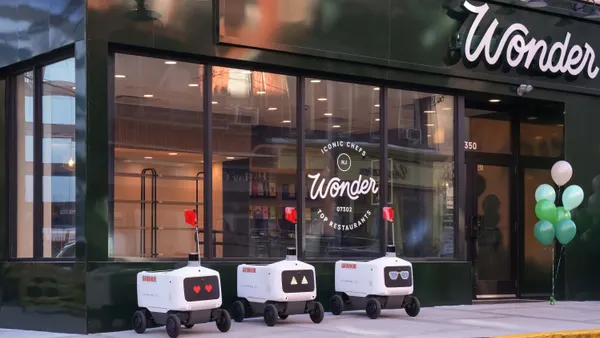Dive Brief:
- Luckin Coffee is expanding into the Greater Middle East and India through a new partnership with Kuwait Food Company Americana (Americana Group).
- According to a news release, Americana Group is the largest integrated food product company in the region, with restaurant operations experience dating back to the 1960s.
- Luckin was founded two years ago and now operates over 3,000 stores across 40 cities in China, compared to Starbucks' 3,300 stores in 141 cities. It aims for more than 4,500 new stores by the end of this year, which would make it the country's largest coffee chain.
Dive Insight:
While Luckin's expansion plans in China are certainly ambitious, its deal with Americana Group shows that it is aiming for market share well beyond its home country. In the release, founder/CEO Jenny Qian Zhiya said this partnership is the company's first step in bringing the brand’s products from China to the world.
The Middle Eastern coffee market is ripe for growth. According to Euromonitor International, cultural shifts have driven a staggering increase in coffee consumption here, with sales growing at twice the global average. Luckin's model also feeds demand for a technology-driven frictionless experience, enabling ordering and payment on its app and operating almost exclusively as a pickup or delivery format. Such a model has especially translated well in China, where consumers are tech savvy, and should do the same in the Middle East, which is considered one of the most technology-forward markets in the world. According to a recent survey from PwC, customers in the Middle East have a bigger tendency to shop on their mobile phones compared to the rest of the world.
Clearly Starbucks is paying attention and is taking a page directly from this relatively new rival. The coffee giant, which has had a presence in China since 1999, launched its first express retail store there earlier this month, with mobile order, pay and delivery.
But Luckin has the advantage here by establishing speed and convenience early on — and a cheaper price point — especially in markets like China and India, which are densely populated. For a habitual product like coffee, speed, convenience and price are arguably the biggest necessities.
While China and the Middle East are certainly interesting narratives in terms of potential competition among the two brands, India could eventually be a bigger story. Starbucks' total store count in India now is about 145 units, which means there is a lot of runway for brand growth. Starbucks' total count in India now is about 145 outlets. By comparison, there are more than twice as many KFCs (350) in the market. With an experienced partner like Americana, which runs brands like TGI Fridays and Krispy Kreme, the race in this country could be neck and neck sooner rather than later.
However, rapid growth aside, there remain some questions about the money-making potential of coffee delivery in China, so Starbucks may be in a more sustainable position competitively with its deep pockets and better ability to absorb costs.
And Luckin's tech-forward approach is not likely to be a competitive advantage for too long. Starbucks just announced a deal with Brightloom to create a end-to-end customer experience platform, which could have a big impact once it's rolled out systemwide.










